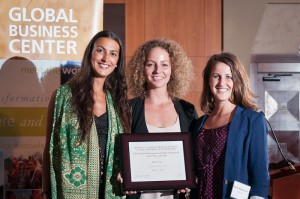The search for the most innovative social entrepreneurs and
their path-breaking business plans has crossed national frontiers.
 |
| Past winners : GSEC |
Kalpavriksha recognises the efforts of Foster Business
School, the proponents of the 9th annual Global Social
Entrepreneurship Competition (GSEC). GSEC is a widely popular platform for the
budding social entrepreneurs of the world with their B-Plans, get mentored by
stalwarts from reputed schools and receive seed funding for implementation of
their projects.
GSEC had partnered with IIM Indore and Kalpavriksha to
provide an opportunity for the winners of Kalpavriksha-2008 to receive a
wildcard entry in the semi-finals of the competition. Team Ahaar eventually
went on to win the GSEC, which went on to show the amazing entrepreneurial
spirit that Kalpavriksha cultivates.
The GSEC application deadline is November 8, 2012. Any
enrolled university student – in any field, at any level of study- is eligible
to apply. GSEC business ideas may focus on any subject area and must address a
problem of poverty in developing countries.
Great news for 2013 :
· GSEC will select 15-20 teams to participate in GSEC Week ( Feb 25 – Mar 1 2012)
· For the 2nd year, travel scholarships will be given to international teams, supported by the Bill & Melinda Gates foundation
· GSEC expects to award at least $30,000 in prizes, including a global health and an Information & Communications Technology (ICT) prize!
· GSEC will select 15-20 teams to participate in GSEC Week ( Feb 25 – Mar 1 2012)
· For the 2nd year, travel scholarships will be given to international teams, supported by the Bill & Melinda Gates foundation
· GSEC expects to award at least $30,000 in prizes, including a global health and an Information & Communications Technology (ICT) prize!




